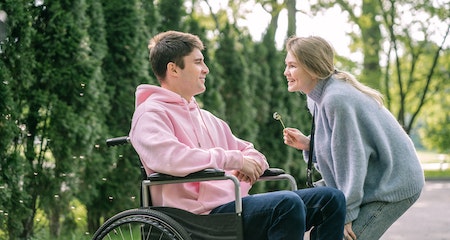According to a recent study, nearly half of the 21 million disabled adults in the United States don’t exercise at all or don’t do enough.
People with disabilities should be active because it improves their mood, stamina, and helps to prevent diseases such as heart disease, diabetes, and cancer. It promotes weight loss and healthy aging.
1. Chair Pushups
If you have a melbourne disability services or health condition that makes it difficult to do standard push-ups, chair pushups are an excellent option. They’re a great way to boost your core strength, strengthen your upper body, and build back muscle.
Performing these exercise for disable is a great way to stay active, improve your health and well-being, and boost your self-esteem. There are a variety of exercises you can perform, so you’ll be sure to find a way that works for you!
Start in a seated position, with your legs behind you. Tilt your upper body forward slightly to lift your bottom off the chair seat. Then slowly lower yourself back to the seated position. Complete 10 repetitions, three times a day, for optimal results.
2. Sit-to-Stand Exercise
The Sit-to-Stand Exercise strengthens the lower body. It can also help you maintain or increase your independence and mobility.
The sit-to-stand exercise is a precursor to squats that can help you gain or maintain the ability to stand up independently, improving leg strength, functional balance, and control. It’s very easy to do from a seat and a great way for you to build your lower body strength.
Talking to your doctor before you start any exercise program is a good idea, especially if there have been recent surgeries.
Children with CP classified in GMFCS levels III and IV received a 6 week, routine physiotherapy programme that included 30 minutes of sit-to-stand exercises twice a week, supervised by a physiotherapist. This intervention had a small impact on caregiver strain and self-care. Moreover, repetitive practice improved sit-to-stand performance. The findings suggest that sit-to-stand training may be a useful focus of therapy in children with CP, and that task-specific training could improve not only sit-to-stand but also other tasks that are typically performed in an upright stance.
3. Pedal Exerciser
The Pedal Exerciser is a great way to strengthen muscles on the lower body, especially the gluteals, hip flexors, calves, and hamstrings. It is also a great exercise for people who have had knee surgery.
A pedal exerciser can be an economical and convenient way to increase muscle strength and cardiovascular fitness. Depending on the model you choose, the resistance can be adjusted to suit your needs.
Some models include an electronic display that displays time, revolution count and rpm. These are handy for tracking progress and keeping you motivated.
These machines are a great addition to any workout routine, but are especially beneficial for those who do not have access to an exercise equipment or for those who cannot get outdoors. They can also be used to provide a moderate-intensity cardio workout, which can help lower blood pressure, improve circulation and build bone mass.
4. Leg Lifts
A leg lift is a device that allows you to move your lower limb. This helps you complete a number of daily tasks, including dressing, getting into or out of a chair or bed, or using a footstool.
There are many options for these devices, from powered models to manual models. Most include a strap that connects to the frame of the bed, and a lifting platform that raises your legs to a level that’s horizontal with the mattress.
The simplest version is made from a long rod and a special sturdy webbing strap. An upper loop fits around your wrist or hand, and a lower stiffened loop slides over your foot to provide control.
Patients with lower limb disabilities, spinal injury, obesity, stroke, or other conditions will appreciate leg lifts. They are also a useful tool for caregivers who need to reposition or transfer their patients. They can be used in the hospital, at home, and even in cars.

